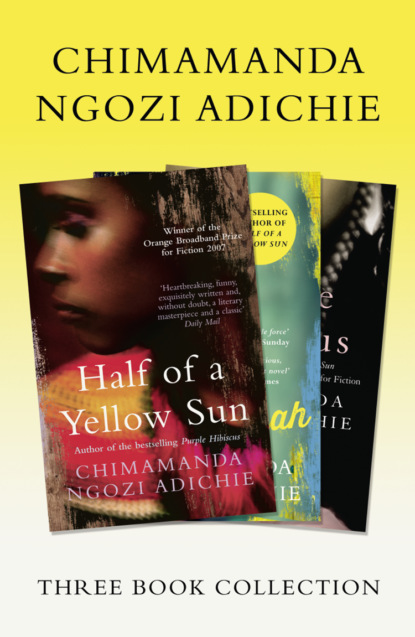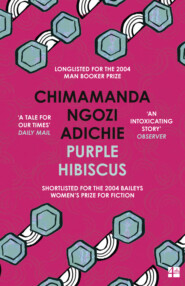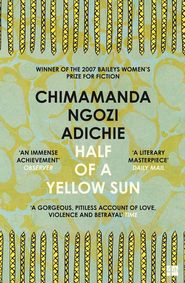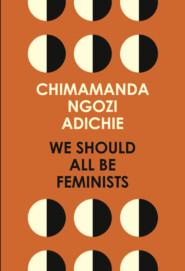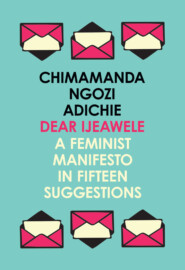По всем вопросам обращайтесь на: info@litportal.ru
(©) 2003-2024.
✖
Half of a Yellow Sun, Americanah, Purple Hibiscus: Chimamanda Ngozi Adichie Three-Book Collection
Автор
Год написания книги
2018
Настройки чтения
Размер шрифта
Высота строк
Поля
Half of a Yellow Sun, Americanah, Purple Hibiscus: Chimamanda Ngozi Adichie Three-Book Collection
Chimamanda Ngozi Adichie
SHORTLISTED FOR THE BAILEY’S WOMEN’S PRIZE FOR FICTION‘A delicious, important novel’ The Times‘Alert, alive and gripping’ Independent‘Some novels tell a great story and others make you change the way you look at the world. Americanah does both.’ GuardianChimamanda Ngozi Adichie has firmly established herself as one of the world’s most exciting and important young writers – a regular award-winner, ‘endowed with the gift of ancient storytellers’ (Chinua Achebe).A gripping, vividly written masterpiece, ‘Half of a Yellow Sun’ won the Orange Prize for Fiction. The lives of Ugwu, a young boy from a poor village, Olanna, a middle class woman, and Richard, a white man and a writer intersect in intimate and unexpected ways during the vicious Nigerian civil war. This is a story about Africa, about moral responsibility, the end of colonialism, ethnic allegiances, class and race – and about how love can move in to complicate all these things.Fearless, gripping, spanning three continents and numerous lives, ‘Americanah’ is a richly told story of love and expectation set in today’s globalized world. Ifemelu and Obinze fell in love as teenagers in Lagos. Thriteen years later, Obinze is a wealthy man in a newly democratic Nigeria; Ifemelu has achieved success as a writer in America. When Ifemelu returns to Nigeria, and the pair reignite their shared passions – for their homeland and for each other – they face the toughest decisions of their lives.‘Purple Hibiscus’ is a compelling tale of adolescence, set against the backdrop of Nigeria’s military coup. Fifteen-year-old Kambili’s life is regulated by the high walls of her family estate and the dictates of her repressive father. However when Nigeria begins to fall apart, Kambili and her brother are sent to live in their aunt’s laughter-filled house, where they discover life, love, and a terrible, bruising secret deep within her family.
Chimamanda Ngozi Adichie Three-Book Collection: Half of a Yellow Sun, Americanah, Purple Hibiscus
MAIN CONTENTS
Cover (#udaef199b-ba6b-50e7-ae33-a96a8534a360)
Title Page (#ud58d16b3-46fd-50f1-91cd-8818b7ad8e1e)
Half of a Yellow Sun (#u4ae4d750-6523-52ca-b667-46829bf4508e)
Americanah (#litres_trial_promo)
Purple Hibiscus (#litres_trial_promo)
A Note on the Author (#litres_trial_promo)
Copyright (#litres_trial_promo)
About the Publisher (#litres_trial_promo)
CHIMAMANDA NGOZI ADICHIE
Half of a Yellow Sun
Contents
MAIN CONTENTS (#u5808c2a0-d9ec-5969-b9a5-32b9a0f73d52)Title Page (#ue56021cf-027b-519f-9502-3e7b0b975eda)Dedication (#u953c2f7f-d3ec-512a-847c-4b12244fa088)Epigraph (#u55993f7a-3a21-5a1e-b7fc-9f508ad45528)Part One: The Early Sixties (#u0d9820d1-696a-5af2-8754-25538706e85e)Chapter One (#u7cb22b9b-93a9-5895-a189-2478c8927e39)Chapter Two (#u317a71ff-0e6b-543d-bcb3-669a25154fe3)Chapter Three (#u2a9cf5aa-c67b-5aaf-b28a-ff73426a1b95)Chapter Four (#uf8424d45-17e7-5890-a50f-ec5a8faec8c7)Chapter Five (#u0f1263ab-a72a-589d-9434-17b51fea6828)Chapter Six (#u080d46d2-43f9-526f-bea8-7b48a633f88c)Part Two: The Late Sixties (#ub000e9b0-e005-5ae1-b0ca-963dc0470ff4)Chapter Seven (#u6e699272-b20f-59d7-aa37-c576c34e6856)Chapter Eight (#ufd27135a-a846-5ac2-b2dd-55f6a83ae150)Chapter Nine (#u0e1bbae8-e714-5fd8-9796-42d4d5c78886)Chapter Ten (#ucf546ffd-0172-5834-aa3c-68f16a7e0a1c)Chapter Eleven (#u8e82d301-1cfb-5594-8a9c-6c6c444fa519)Chapter Twelve (#uc2429e64-e692-526e-a8a5-02d0f5155ee4)Chapter Thirteen (#ueb0fa288-de49-574f-9f21-8a555a0359db)Chapter Fourteen (#u4608556a-42dc-5cb9-8fff-c5e848144fcb)Chapter Fifteen (#ucc01623e-a087-562c-9cc8-6dcd9a7a613e)Chapter Sixteen (#u858fb131-c9fb-54f7-9728-2f41aaafe387)Chapter Seventeen (#ub40e6a6c-28c4-585b-acf0-bab0caac0c34)Chapter Eighteen (#uf1e91f43-43df-5ef2-81c3-237fdcb5e8ad)Part Three: The Early Sixties (#u56dddc78-35e5-532f-8ea8-a27fa72e73ac)Chapter Nineteen (#u7275b3e7-aebc-5262-b53f-efc8a4d26802)Chapter Twenty (#ue756b7a2-7389-5734-9cc1-b567f1dd5e62)Chapter Twenty One (#u9cb2e372-9740-597c-ad83-4cf9a8f47855)Chapter Twenty Two (#u46676a75-e8e6-5e28-938a-80ad9d41f91b)Chapter Twenty Three (#u84849e50-05b4-5d29-8b1b-c1187c93bce8)Chapter Twenty Four (#u51acbf0d-1ca5-571d-afc3-352a1f485e13)Part Four: The Late Sixties (#ua33d550b-27a0-58a6-96fd-3421812c688a)Chapter Twenty Five (#u86be87d1-7c4d-5e64-8a6f-7650ac9eeb8f)Chapter Twenty Six (#litres_trial_promo)Chapter Twenty Seven (#litres_trial_promo)Chapter Twenty Eight (#litres_trial_promo)Chapter Twenty Nine (#litres_trial_promo)Chapter Thirty (#litres_trial_promo)Chapter Thirty One (#litres_trial_promo)Chapter Thirty Two (#litres_trial_promo)Chapter Thirty Three (#litres_trial_promo)Chapter Thirty Four (#litres_trial_promo)Chapter Thirty Five (#litres_trial_promo)Chapter Thirty Six (#litres_trial_promo)Chapter Thirty Seven (#litres_trial_promo)Author's Note (#litres_trial_promo)
Dedication (#u3c1576f1-c916-57b7-bb43-a63c028a7109)
My grandfathers, whom I never knew,
Nwoye David Adichie and Aro-Nweke Felix Odigwe,
did not survive the war.
My grandmothers, Nwabuodu Regina Odigwe and Nwamgbafor Agnes Adichie, remarkable women both, did.
This book is dedicated to their memories: ka fa nodu na ndokwa.
And to Mellitus, wherever he may be.
Epigraph (#u3c1576f1-c916-57b7-bb43-a63c028a7109)
Today I see it still –
Dry, wire-thin in sun and dust of the dry months –
Headstone on tiny debris of passionate courage.
– Chinua Achebe,
From ‘Mango Seedling’ in Christmasin Biafra and Other Poems
PART ONE (#u3c1576f1-c916-57b7-bb43-a63c028a7109)
The Early Sixties (#u3c1576f1-c916-57b7-bb43-a63c028a7109)
1 (#u3c1576f1-c916-57b7-bb43-a63c028a7109)
Master was a little crazy; he had spent too many years reading books overseas, talked to himself in his office, did not always return greetings, and had too much hair. Ugwu’s aunty said this in a low voice as they walked on the path. ‘But he is a good man,’ she added. ‘And as long as you work well, you will eat well. You will even eat meat every day.’ She stopped to spit; the saliva left her mouth with a sucking sound and landed on the grass.
Ugwu did not believe that anybody, not even this master he was going to live with, ate meat every day. He did not disagree with his aunty, though, because he was too choked with expectation, too busy imagining his new life away from the village. They had been walking for a while now, since they got off the lorry at the motor park, and the afternoon sun burned the back of his neck. But he did not mind. He was prepared to walk hours more in even hotter sun. He had never seen anything like the streets that appeared after they went past the university gates, streets so smooth and tarred that he itched to lay his cheek down on them. He would never be able to describe to his sister Anulika how the bungalows here were painted the colour of the sky and sat side by side like polite, well-dressed men, how the hedges sep arating them were trimmed so flat on top that they looked like tables wrapped with leaves.
His aunty walked faster, her slippers making slap-slap sounds that echoed in the silent street. Ugwu wondered if she, too, could feel the coal tar getting hotter underneath, through her thin soles. They went past a sign, ODIM STREET, and Ugwu mouthed street, as he did whenever he saw an English word that was not too long. He smelt something sweet, heady, as they walked into a compound, and was sure it came from the white flowers clustered on the bushes at the entrance. The bushes were shaped like slender hills. The lawn glistened. Butterflies hovered above.
‘I told Master you will learn everything fast, osiso-osiso,’ his aunty said. Ugwu nodded attentively although she had already told him this many times, as often as she told him the story of how his good fortune came about: While she was sweeping the corridor in the Mathematics Department a week ago, she heard Master say that he needed a houseboy to do his cleaning, and she immediately said she could help, speaking before his typist or office messenger could offer to bring someone.
‘I will learn fast, Aunty,’ Ugwu said. He was staring at the car in the garage; a strip of metal ran around its blue body like a necklace.
‘Remember, what you will answer whenever he calls you is Yes,sah!’
‘Yes, sah!’ Ugwu repeated.
They were standing before the glass door. Ugwu held back from reaching out to touch the cement wall, to see how different it would feel from the mud walls of his mother’s hut that still bore the faint patterns of moulding fingers. For a brief moment, he wished he were back there now, in his mother’s hut, under the dim coolness of the thatch roof; or in his aunty’s hut, the only one in the village with a corrugated-iron roof.
His aunty tapped on the glass. Ugwu could see the white curtains behind the door. A voice said, in English, ‘Yes? Come in.’
They took off their slippers before walking in. Ugwu had never seen a room so wide. Despite the brown sofas arranged in a semicircle, the side tables between them, the shelves crammed with books, and the centre table with a vase of red and white plastic flowers, the room still seemed to have too much space. Master sat in an armchair, wearing a singlet and a pair of shorts. He was not sitting upright but slanted, a book covering his face, as though oblivious that he had just asked people in.
‘Good afternoon, sah! This is the child,’ Ugwu’s aunty said.
Master looked up. His complexion was very dark, like old bark, and the hair that covered his chest and legs was a lustrous, darker shade. He pulled off his glasses. ‘The child?’
‘The houseboy, sah.’
‘Oh, yes, you have brought the houseboy. I kpotago ya.’ Master’s Igbo felt feathery in Ugwu’s ears. It was Igbo coloured by the sliding sounds of English, the Igbo of one who spoke English often.
‘He will work hard,’ his aunty said. ‘He is a very good boy. Just tell him what he should do. Thank, sah!’
Master grunted in response, watching Ugwu and his aunty with a faintly distracted expression, as if their presence made it difficult for him to remember something important. Ugwu’s aunty patted Ugwu’s shoulder, whispered that he should do well, and turned to the door. After she left, Master put his glasses back on and faced his book, relaxing further into a slanting position, legs stretched out. Even when he turned the pages he did so with his eyes on the book.
Ugwu stood by the door, waiting. Sunlight streamed in through the windows, and from time to time, a gentle breeze lifted the curtains. The room was silent except for the rustle of Master’s page turning. Ugwu stood for a while before he began to edge closer and closer to the bookshelf, as though to hide in it, and then, after a while, he sank down to the floor, cradling his raffia bag between his knees. He looked up at the ceiling, so high up, so piercingly white. He closed his eyes and tried to reimagine this spacious room with the alien furniture, but he couldn’t. He opened his eyes, overcome by a new wonder, and looked around to make sure it was all real. To think that he would sit on these sofas, polish this slippery-smooth floor, wash these gauzy curtains.
‘Kedu afa gi? What’s your name?’ Master asked, startling him.
Chimamanda Ngozi Adichie
SHORTLISTED FOR THE BAILEY’S WOMEN’S PRIZE FOR FICTION‘A delicious, important novel’ The Times‘Alert, alive and gripping’ Independent‘Some novels tell a great story and others make you change the way you look at the world. Americanah does both.’ GuardianChimamanda Ngozi Adichie has firmly established herself as one of the world’s most exciting and important young writers – a regular award-winner, ‘endowed with the gift of ancient storytellers’ (Chinua Achebe).A gripping, vividly written masterpiece, ‘Half of a Yellow Sun’ won the Orange Prize for Fiction. The lives of Ugwu, a young boy from a poor village, Olanna, a middle class woman, and Richard, a white man and a writer intersect in intimate and unexpected ways during the vicious Nigerian civil war. This is a story about Africa, about moral responsibility, the end of colonialism, ethnic allegiances, class and race – and about how love can move in to complicate all these things.Fearless, gripping, spanning three continents and numerous lives, ‘Americanah’ is a richly told story of love and expectation set in today’s globalized world. Ifemelu and Obinze fell in love as teenagers in Lagos. Thriteen years later, Obinze is a wealthy man in a newly democratic Nigeria; Ifemelu has achieved success as a writer in America. When Ifemelu returns to Nigeria, and the pair reignite their shared passions – for their homeland and for each other – they face the toughest decisions of their lives.‘Purple Hibiscus’ is a compelling tale of adolescence, set against the backdrop of Nigeria’s military coup. Fifteen-year-old Kambili’s life is regulated by the high walls of her family estate and the dictates of her repressive father. However when Nigeria begins to fall apart, Kambili and her brother are sent to live in their aunt’s laughter-filled house, where they discover life, love, and a terrible, bruising secret deep within her family.
Chimamanda Ngozi Adichie Three-Book Collection: Half of a Yellow Sun, Americanah, Purple Hibiscus
MAIN CONTENTS
Cover (#udaef199b-ba6b-50e7-ae33-a96a8534a360)
Title Page (#ud58d16b3-46fd-50f1-91cd-8818b7ad8e1e)
Half of a Yellow Sun (#u4ae4d750-6523-52ca-b667-46829bf4508e)
Americanah (#litres_trial_promo)
Purple Hibiscus (#litres_trial_promo)
A Note on the Author (#litres_trial_promo)
Copyright (#litres_trial_promo)
About the Publisher (#litres_trial_promo)
CHIMAMANDA NGOZI ADICHIE
Half of a Yellow Sun
Contents
MAIN CONTENTS (#u5808c2a0-d9ec-5969-b9a5-32b9a0f73d52)Title Page (#ue56021cf-027b-519f-9502-3e7b0b975eda)Dedication (#u953c2f7f-d3ec-512a-847c-4b12244fa088)Epigraph (#u55993f7a-3a21-5a1e-b7fc-9f508ad45528)Part One: The Early Sixties (#u0d9820d1-696a-5af2-8754-25538706e85e)Chapter One (#u7cb22b9b-93a9-5895-a189-2478c8927e39)Chapter Two (#u317a71ff-0e6b-543d-bcb3-669a25154fe3)Chapter Three (#u2a9cf5aa-c67b-5aaf-b28a-ff73426a1b95)Chapter Four (#uf8424d45-17e7-5890-a50f-ec5a8faec8c7)Chapter Five (#u0f1263ab-a72a-589d-9434-17b51fea6828)Chapter Six (#u080d46d2-43f9-526f-bea8-7b48a633f88c)Part Two: The Late Sixties (#ub000e9b0-e005-5ae1-b0ca-963dc0470ff4)Chapter Seven (#u6e699272-b20f-59d7-aa37-c576c34e6856)Chapter Eight (#ufd27135a-a846-5ac2-b2dd-55f6a83ae150)Chapter Nine (#u0e1bbae8-e714-5fd8-9796-42d4d5c78886)Chapter Ten (#ucf546ffd-0172-5834-aa3c-68f16a7e0a1c)Chapter Eleven (#u8e82d301-1cfb-5594-8a9c-6c6c444fa519)Chapter Twelve (#uc2429e64-e692-526e-a8a5-02d0f5155ee4)Chapter Thirteen (#ueb0fa288-de49-574f-9f21-8a555a0359db)Chapter Fourteen (#u4608556a-42dc-5cb9-8fff-c5e848144fcb)Chapter Fifteen (#ucc01623e-a087-562c-9cc8-6dcd9a7a613e)Chapter Sixteen (#u858fb131-c9fb-54f7-9728-2f41aaafe387)Chapter Seventeen (#ub40e6a6c-28c4-585b-acf0-bab0caac0c34)Chapter Eighteen (#uf1e91f43-43df-5ef2-81c3-237fdcb5e8ad)Part Three: The Early Sixties (#u56dddc78-35e5-532f-8ea8-a27fa72e73ac)Chapter Nineteen (#u7275b3e7-aebc-5262-b53f-efc8a4d26802)Chapter Twenty (#ue756b7a2-7389-5734-9cc1-b567f1dd5e62)Chapter Twenty One (#u9cb2e372-9740-597c-ad83-4cf9a8f47855)Chapter Twenty Two (#u46676a75-e8e6-5e28-938a-80ad9d41f91b)Chapter Twenty Three (#u84849e50-05b4-5d29-8b1b-c1187c93bce8)Chapter Twenty Four (#u51acbf0d-1ca5-571d-afc3-352a1f485e13)Part Four: The Late Sixties (#ua33d550b-27a0-58a6-96fd-3421812c688a)Chapter Twenty Five (#u86be87d1-7c4d-5e64-8a6f-7650ac9eeb8f)Chapter Twenty Six (#litres_trial_promo)Chapter Twenty Seven (#litres_trial_promo)Chapter Twenty Eight (#litres_trial_promo)Chapter Twenty Nine (#litres_trial_promo)Chapter Thirty (#litres_trial_promo)Chapter Thirty One (#litres_trial_promo)Chapter Thirty Two (#litres_trial_promo)Chapter Thirty Three (#litres_trial_promo)Chapter Thirty Four (#litres_trial_promo)Chapter Thirty Five (#litres_trial_promo)Chapter Thirty Six (#litres_trial_promo)Chapter Thirty Seven (#litres_trial_promo)Author's Note (#litres_trial_promo)
Dedication (#u3c1576f1-c916-57b7-bb43-a63c028a7109)
My grandfathers, whom I never knew,
Nwoye David Adichie and Aro-Nweke Felix Odigwe,
did not survive the war.
My grandmothers, Nwabuodu Regina Odigwe and Nwamgbafor Agnes Adichie, remarkable women both, did.
This book is dedicated to their memories: ka fa nodu na ndokwa.
And to Mellitus, wherever he may be.
Epigraph (#u3c1576f1-c916-57b7-bb43-a63c028a7109)
Today I see it still –
Dry, wire-thin in sun and dust of the dry months –
Headstone on tiny debris of passionate courage.
– Chinua Achebe,
From ‘Mango Seedling’ in Christmasin Biafra and Other Poems
PART ONE (#u3c1576f1-c916-57b7-bb43-a63c028a7109)
The Early Sixties (#u3c1576f1-c916-57b7-bb43-a63c028a7109)
1 (#u3c1576f1-c916-57b7-bb43-a63c028a7109)
Master was a little crazy; he had spent too many years reading books overseas, talked to himself in his office, did not always return greetings, and had too much hair. Ugwu’s aunty said this in a low voice as they walked on the path. ‘But he is a good man,’ she added. ‘And as long as you work well, you will eat well. You will even eat meat every day.’ She stopped to spit; the saliva left her mouth with a sucking sound and landed on the grass.
Ugwu did not believe that anybody, not even this master he was going to live with, ate meat every day. He did not disagree with his aunty, though, because he was too choked with expectation, too busy imagining his new life away from the village. They had been walking for a while now, since they got off the lorry at the motor park, and the afternoon sun burned the back of his neck. But he did not mind. He was prepared to walk hours more in even hotter sun. He had never seen anything like the streets that appeared after they went past the university gates, streets so smooth and tarred that he itched to lay his cheek down on them. He would never be able to describe to his sister Anulika how the bungalows here were painted the colour of the sky and sat side by side like polite, well-dressed men, how the hedges sep arating them were trimmed so flat on top that they looked like tables wrapped with leaves.
His aunty walked faster, her slippers making slap-slap sounds that echoed in the silent street. Ugwu wondered if she, too, could feel the coal tar getting hotter underneath, through her thin soles. They went past a sign, ODIM STREET, and Ugwu mouthed street, as he did whenever he saw an English word that was not too long. He smelt something sweet, heady, as they walked into a compound, and was sure it came from the white flowers clustered on the bushes at the entrance. The bushes were shaped like slender hills. The lawn glistened. Butterflies hovered above.
‘I told Master you will learn everything fast, osiso-osiso,’ his aunty said. Ugwu nodded attentively although she had already told him this many times, as often as she told him the story of how his good fortune came about: While she was sweeping the corridor in the Mathematics Department a week ago, she heard Master say that he needed a houseboy to do his cleaning, and she immediately said she could help, speaking before his typist or office messenger could offer to bring someone.
‘I will learn fast, Aunty,’ Ugwu said. He was staring at the car in the garage; a strip of metal ran around its blue body like a necklace.
‘Remember, what you will answer whenever he calls you is Yes,sah!’
‘Yes, sah!’ Ugwu repeated.
They were standing before the glass door. Ugwu held back from reaching out to touch the cement wall, to see how different it would feel from the mud walls of his mother’s hut that still bore the faint patterns of moulding fingers. For a brief moment, he wished he were back there now, in his mother’s hut, under the dim coolness of the thatch roof; or in his aunty’s hut, the only one in the village with a corrugated-iron roof.
His aunty tapped on the glass. Ugwu could see the white curtains behind the door. A voice said, in English, ‘Yes? Come in.’
They took off their slippers before walking in. Ugwu had never seen a room so wide. Despite the brown sofas arranged in a semicircle, the side tables between them, the shelves crammed with books, and the centre table with a vase of red and white plastic flowers, the room still seemed to have too much space. Master sat in an armchair, wearing a singlet and a pair of shorts. He was not sitting upright but slanted, a book covering his face, as though oblivious that he had just asked people in.
‘Good afternoon, sah! This is the child,’ Ugwu’s aunty said.
Master looked up. His complexion was very dark, like old bark, and the hair that covered his chest and legs was a lustrous, darker shade. He pulled off his glasses. ‘The child?’
‘The houseboy, sah.’
‘Oh, yes, you have brought the houseboy. I kpotago ya.’ Master’s Igbo felt feathery in Ugwu’s ears. It was Igbo coloured by the sliding sounds of English, the Igbo of one who spoke English often.
‘He will work hard,’ his aunty said. ‘He is a very good boy. Just tell him what he should do. Thank, sah!’
Master grunted in response, watching Ugwu and his aunty with a faintly distracted expression, as if their presence made it difficult for him to remember something important. Ugwu’s aunty patted Ugwu’s shoulder, whispered that he should do well, and turned to the door. After she left, Master put his glasses back on and faced his book, relaxing further into a slanting position, legs stretched out. Even when he turned the pages he did so with his eyes on the book.
Ugwu stood by the door, waiting. Sunlight streamed in through the windows, and from time to time, a gentle breeze lifted the curtains. The room was silent except for the rustle of Master’s page turning. Ugwu stood for a while before he began to edge closer and closer to the bookshelf, as though to hide in it, and then, after a while, he sank down to the floor, cradling his raffia bag between his knees. He looked up at the ceiling, so high up, so piercingly white. He closed his eyes and tried to reimagine this spacious room with the alien furniture, but he couldn’t. He opened his eyes, overcome by a new wonder, and looked around to make sure it was all real. To think that he would sit on these sofas, polish this slippery-smooth floor, wash these gauzy curtains.
‘Kedu afa gi? What’s your name?’ Master asked, startling him.





